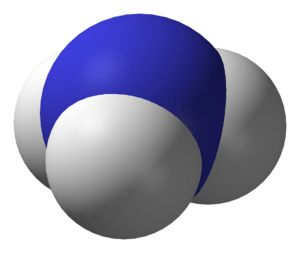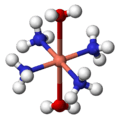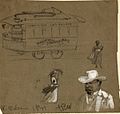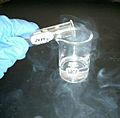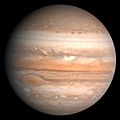Ammonia facts for kids
Ammonia is a common chemical compound. Its formula is NH3. This means it is made from one nitrogen atom and three hydrogen atoms joined together. Ammonia is different from Ammonium, which has a formula of NH4+.
Contents
What is Ammonia Like?
Ammonia has some special features:
- It is a gas at normal room temperature.
- It has no color.
- You can easily recognize it by its very strong, sharp smell.
- It is a base and an alkali, which means it can react with acids.
- It can be harmful if you drink it or breathe in too much.
- It dissolves well in water, creating a liquid called household ammonia.
How Do We Use Ammonia?
Ammonia is a very important chemical used in many ways:
- Making Fertilizers: A lot of ammonia is used to create fertilizers like Ammonium nitrate. These help plants grow better on farms.
- Making Other Chemicals: It is used to make nitric acid, which is then used to produce many other useful chemicals.
- Cleaning: When ammonia is mixed with water, it becomes household ammonia. This is a common cleaning product, especially good for cleaning glass.
- Refrigeration: Ammonia can be used in refrigerators and cooling systems to make things cold.
- Wood Pulp: It helps in preparing wood pulp, which is used to make paper.
How Ammonia is Made
In the past, ammonia was mostly made from animal waste, like urine. Today, most ammonia is made using a special process called the Haber process. This method uses high temperatures and pressures with special materials called catalysts to speed up the reaction.
Ammonia and Fish Tanks
Ammonia is toxic, meaning it can be harmful. If a fish tank gets dirty from fish waste, ammonia can build up. This can cause "ammonia burns" on fish, which look like black spots or patches on their bodies. To keep fish healthy, their tank needs to be big enough and have a good filter to remove waste.
Making Ammonia for the World
Ammonia is one of the most produced chemicals in the world because it has so many uses. In 2004, about 109 million metric tonnes of ammonia were made worldwide! Most of this, about 80%, is used for fertilizers in farming.
Today, ammonia is mainly made from natural gas (like methane) or other gases like propane and butane. Here's a simplified idea of how it works:
- First, hydrogen gas is made from natural gas. This involves several steps to clean the gas and change it into hydrogen.
- Then, this hydrogen gas is mixed with nitrogen gas. Nitrogen comes from the air around us.
- Finally, the hydrogen and nitrogen react together under high pressure and with a catalyst to form liquid ammonia. This important step is the Haber-Bosch process.
In the past, some ammonia was made using electricity to split water into hydrogen and oxygen. For example, a plant in Vemork in Europe used this method.
Related pages
Images for kids
-
This high-pressure reactor was built in 1921 by BASF in Ludwigshafen, Germany.
-
An ammonia-powered streetcar in New Orleans from 1871.
-
The world's longest ammonia pipeline (about 2400 km long), running from Russia to Ukraine.
-
Ammonia is found in the atmospheres of giant planets like Jupiter and Saturn.
See also
 In Spanish: Amoníaco para niños
In Spanish: Amoníaco para niños
 | Frances Mary Albrier |
 | Whitney Young |
 | Muhammad Ali |



